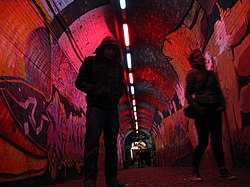
Squatting is the action of occupying an abandoned or unoccupied area of land or a building, usually residential, that the squatter does not own, rent or otherwise have lawful permission to use. The United Nations estimated in 2003 that there were one billion slum residents and squatters globally. Squatting occurs worldwide and tends to occur when people find empty buildings or land to occupy for housing. It has a long history, broken down by country below.

Manu Chao is a French singer of Spanish descent. He sings in French, Spanish, English, Italian, Arabic, Catalan, Galician, Portuguese, Greek, and occasionally in other languages. Chao began his musical career in Paris, busking and playing with groups such as Hot Pants and Los Carayos, which combined a variety of languages and musical styles. With friends and his brother Antoine Chao, he founded the band Mano Negra in 1987, achieving considerable success, particularly in Europe. He became a solo artist after its breakup in 1995 and since then tours regularly with his live band, Radio Bemba.

Nettuno is a town and comune of the Metropolitan City of Rome in the Lazio region of central Italy, 60 kilometres south of Rome. A resort city and agricultural center on the Tyrrhenian Sea, it has a population of approximately 50,000.
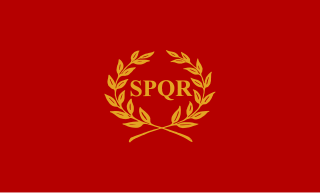
Nova Roma is an international Roman cultural revivalist and reconstructionist organization created in 1998, later incorporated in Maine (USA) as a non-profit organization with an educational and spiritual mission. Nova Roma is dedicated to promote "the restoration of classical Roman religion, culture, and virtues" and "shared Roman ideals".

Infoshops are places in which people can access anarchist or autonomist ideas. They are often stand-alone projects, or can form part of a larger radical bookshop, archive, self-managed social centre or community centre. Typically, infoshops offer flyers, posters, zines, pamphlets and books for sale or donation. Other items such as badges, locally produced artworks and T-shirts are also often available. Infoshops can also provide printing and copying facilities for people to produce their own literature or have a meeting space.

Tor Vergata University of Rome, also known as the University of Tor Vergata, is a public research university located in Rome, Italy. Located in the southeastern suburb of Rome, the university combines a liberal arts tradition with emphasis on career orientation in the field of Economics, Engineering, Mathematics and Physics, Natural Sciences, and Medicine.
Autonomism, also known as Autonomist Marxism, is an anti-capitalist social movement and Marxist-based theoretical current that first emerged in Italy in the 1960s from workerism. Later, post-Marxist and anarchist tendencies became significant after influence from the Situationists, the failure of Italian far-left movements in the 1970s, and the emergence of a number of important theorists including Antonio Negri, who had contributed to the 1969 founding of Potere Operaio as well as Mario Tronti, Paolo Virno and Franco "Bifo" Berardi.

Virtus Roma 1960, commonly known as Virtus Roma, is an Italian professional basketball club based in Rome, Lazio. The club, named Pallacanestro Virtus Roma competed in the first division of Italian basketball, the LBA, for decades until 2020, when it failed. In 2021 the club was refounded.

Self-managed social centres in the United Kingdom can be found in squatted, rented, mortgaged and fully owned buildings. These self-managed social centres differ from community centres in that they are self-organised under anti-authoritarian principles and volunteer-run, without any assistance from the state. The largest number have occurred in London from the 1980s onwards, although projects exist in most cities across the UK, linked in a network. Squatted social centres tend to be quickly evicted and therefore some projects deliberately choose a short-term existence, such as A-Spire in Leeds or the Okasional Café in Manchester. Longer term social centres include the 1 in 12 Club in Bradford, the Cowley Club in Brighton and the Sumac Centre in Nottingham, which are co-operatively owned.

Self-managed social centres in Italy exist in many cities. They are part of different left-wing political networks including anarchist, communist, socialist, and autonomist. The centres tend to be squatted and provide self-organised, self-financing spaces for alternative and noncommercial activities such as concerts, exhibitions, farmers' markets, infoshops, and migrant initiatives. Over time, some but not all projects have opted to legalize their status.

Hard Candy Fitness was a chain of fitness centres that were a partnership between Madonna, her manager Guy Oseary and Mark Mastrov, the founder and CEO of 24 Hour Fitness. Founded in 2010, the venture had centres in Berlin, Mexico City, Moscow, Rome, Santiago, St. Petersburg, and Sydney. The company's name was a reference to Madonna's 2008 studio album Hard Candy. The German division went into administration in 2016 and closed its studios that year. That same year, the location in Toronto was rebranded as Aura Fitness after the initial media attention didn't translate into gym memberships. The only club remaining in operation as of 2019 was in Santiago, Chile, which rebranded as Energy Sport Club in May 2019.

A far-right social centre is a space inspired by neo-fascist and Third Position ideas, typically in the 21st century.
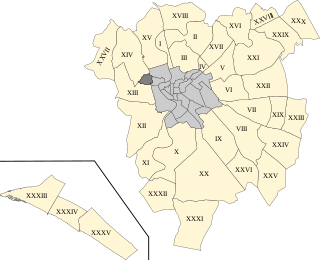
The Quarters of Rome are the areas in and around the Italian city of Rome which became urbanised after the foundation of the last city-centre rione, Prati.

Squatting in the Netherlands is the occupation of unused or derelict buildings or land without the permission of the owner. The modern squatters movement began in the 1960s in the Netherlands. By the 1980s, it had become a powerful anarchist social movement which regularly came into conflict with the state, particularly in Amsterdam with the Vondelstraat and coronation riots.
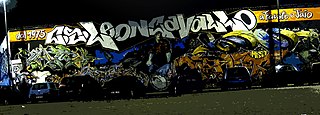
Centro Sociale Leoncavallo is a self-managed social centre in Milan, Italy, which exists since a former factory on via Leoncavallo was squatted in 1975. It was evicted and partially demolished in 1989, then quickly reoccupied and rebuilt. It was evicted again in 1994 and briefly moved to a warehouse for six months before occupying its still extant location on via Antoine Watteau. Activities include concerts, theatre, debates, exhibitions and a radio station. The centre describes itself as Leoncavallo Self-Managed Public Space.
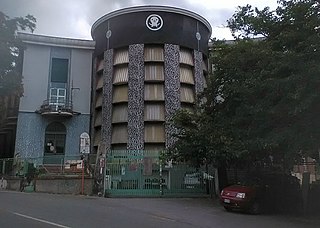
Buridda, officially known as LSOA Buridda, is a squatted self-managed social centre in the city of Genoa, Italy. It was established in 2003 and has changed location several times since inception, due to its uncertain legal status. The centre is wholly run and organized by volunteers and funds itself through donations and fundraising. It offers various services and activities to the community, including open space for exercise, circus-related facilities and skills training, art spaces and workshops, wood and metalworking shops with tools and machinery, 3D printers, communal kitchen, and an amateur radio station.

Squatting in Spain refers to the occupation of unused or derelict buildings or land without the permission of the owner. In Francoist Spain migrant workers lived in slums on the periphery of cities. During the Spanish transition to democracy, residential squatting occurred in Spanish cities such as Barcelona, Bilbao, Madrid, Valencia and Zaragoza. From the 1980s onwards a new generation of squatters set up self-managed social centres which hosted events and campaigns. The 1995 Criminal Code among other things criminalised squatting, but failed to stop it. Social centres exist across the country and in Barcelona and Madrid in particular. In the Basque Country they are known as gaztetxes.

Squatting in Croatia has existed as a phenomenon since the decline of the Roman Empire. In the 1960s much private housing in major cities was illegally constructed or expanded and since the 1990s squatting is used as a tactic by feminists, punks and anarchists. Well-known self-managed social centres such as the cultural centre Karlo Rojc in Pula, Nigdjezemska in Zadar and (AKC) Medika in Zagreb.
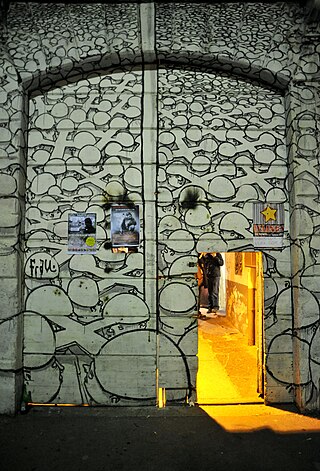
Cox 18 is a self-managed social centre in Milan, Italy. It was first squatted in 1976 and after being evicted in 1989 was quickly re-squatted. It houses the Calusca bookshop and the Primo Moroni archive.
